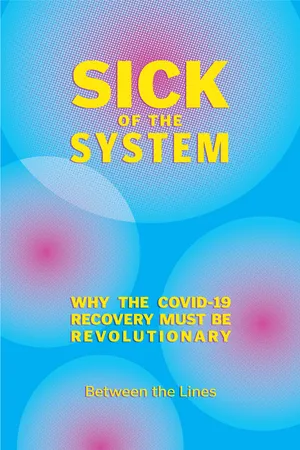
- 169 pages
- English
- ePUB (mobile friendly)
- Available on iOS & Android
About this book
Families left grieving; small businesses shuttered; communities in lockdown; precarious workers set adrift; health care workers stressed beyond endurance. The COVID-19 pandemic has shaken the world to its core. But the cracks already ran deep.
Featuring essays on poverty, health care, incarceration, basic income, policing, Indigenous communities, and more, this anthology delivers a stinging rebuke of the pre-pandemic status quo and a stark exposé of the buried weaknesses in our social and political systems. As policy makers scramble to bail out corporations and preserve an unsustainable labour market, an even greater global catastrophe – in the form of ecological collapse, economic recession, and runaway inequality – looms large on the horizon.
What can we do? From professors to poets, the authors of Sick of the System speak in one voice: We can turn our backs on "normal." We can demand divestment, redistribution, and mutual aid. We can seize new forms of solidarity with both hands. As the world holds its breath, revolutionary ideas have an unprecedented chance to gain ground. There should be no going back.
Frequently asked questions
- Essential is ideal for learners and professionals who enjoy exploring a wide range of subjects. Access the Essential Library with 800,000+ trusted titles and best-sellers across business, personal growth, and the humanities. Includes unlimited reading time and Standard Read Aloud voice.
- Complete: Perfect for advanced learners and researchers needing full, unrestricted access. Unlock 1.4M+ books across hundreds of subjects, including academic and specialized titles. The Complete Plan also includes advanced features like Premium Read Aloud and Research Assistant.
Please note we cannot support devices running on iOS 13 and Android 7 or earlier. Learn more about using the app.
Information
No One Is Disposable
Depopulating Carceral Sites during the COVID-19 Pandemic and Beyond
Robyn Maynard and Justin Piché
Table of contents
- Cover
- Title page
- Epigraph
- Table of Contents
- Preface
- Introduction: Politics and Pandemics
- If It’s a War against COVID-19, Who Are the Soldiers on the Front Lines?
- Novel Virus, Old Story: Government Failings Put Health-Care Workers at Risk
- Whither the Medicine Chest? COVID-19 and the Histories and Contemporary Realities of Colonial Violence
- Sheltered in Place: Violence against Women in Lockdown
- The Pandemic and the War on the Poor
- COVID-19 and Toxic Capitalism
- A Good Idea Goes Viral: Basic Income 2020
- Learning from AIDS Activism for Surviving the COVID-19 Pandemic
- We Can’t Police Our Way out of a Pandemic
- Doing Time during COVID-19: Accounts from Three People Who Are Incarcerated
- No One Is Disposable: Depopulating Carceral Sites during the COVID-19 Pandemic and Beyond
- Fighting the Virus, Fighting for Change
- Take Care: A Community Response to COVID-19
- Fragments for a Pandemic
- How to Build a Better World: Transformative Justice and the Apocalypse
- Wayfinding with Metaphors through Crises: A View from Inside 2020
- Beyond the Plague State
- Copyright